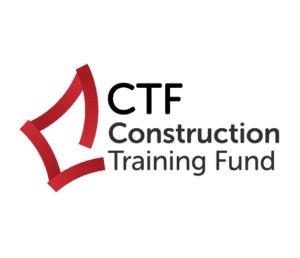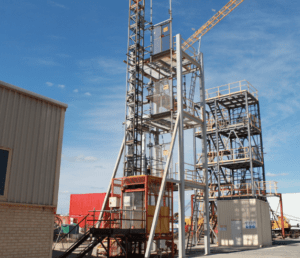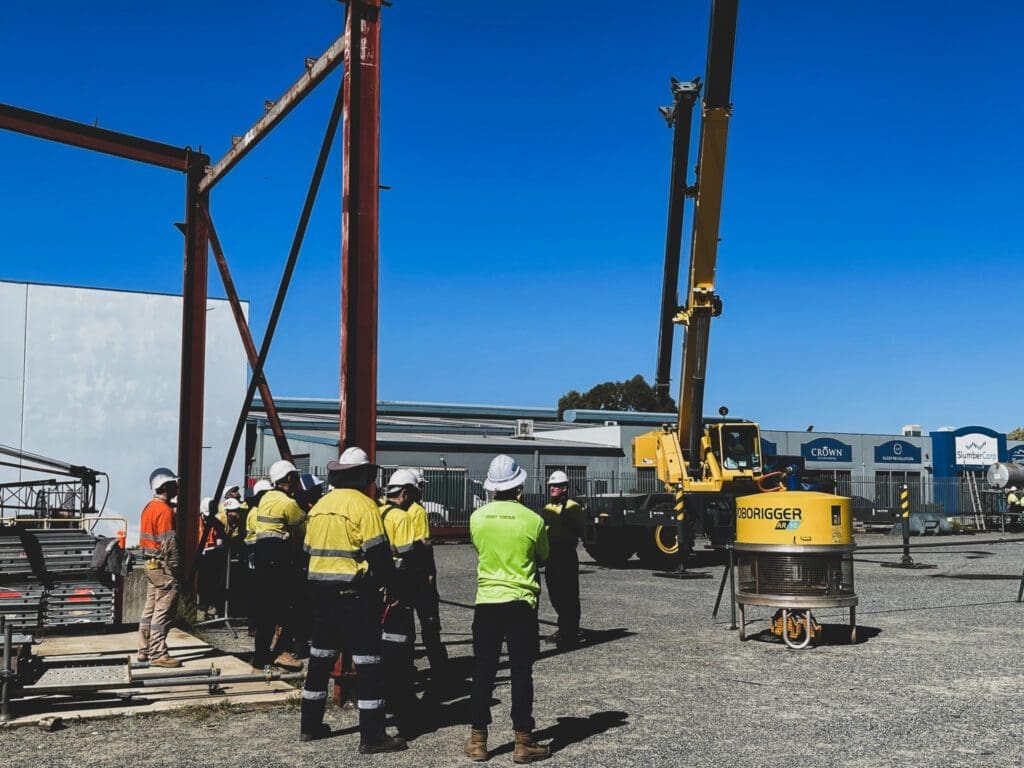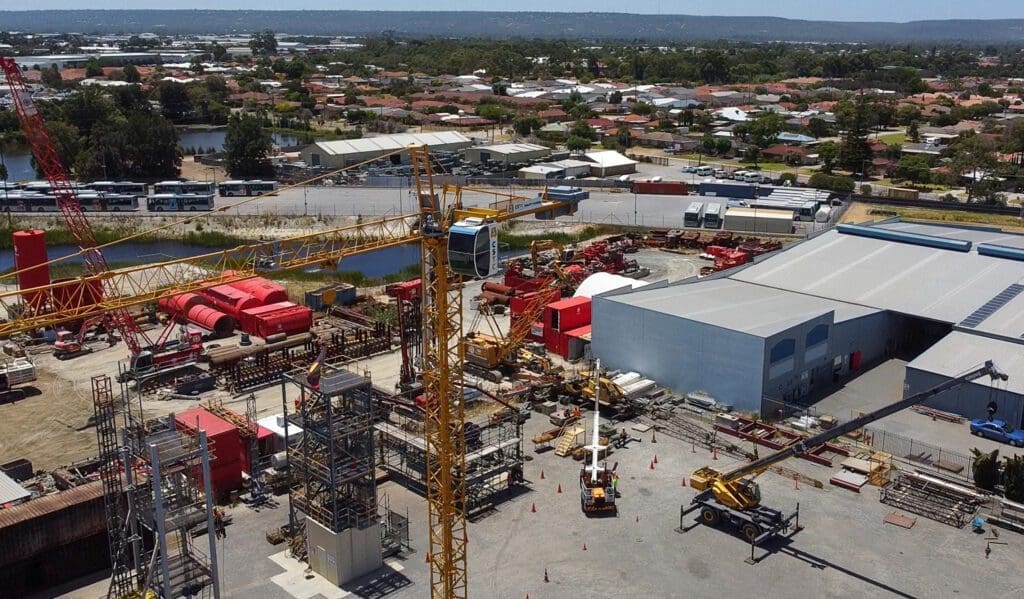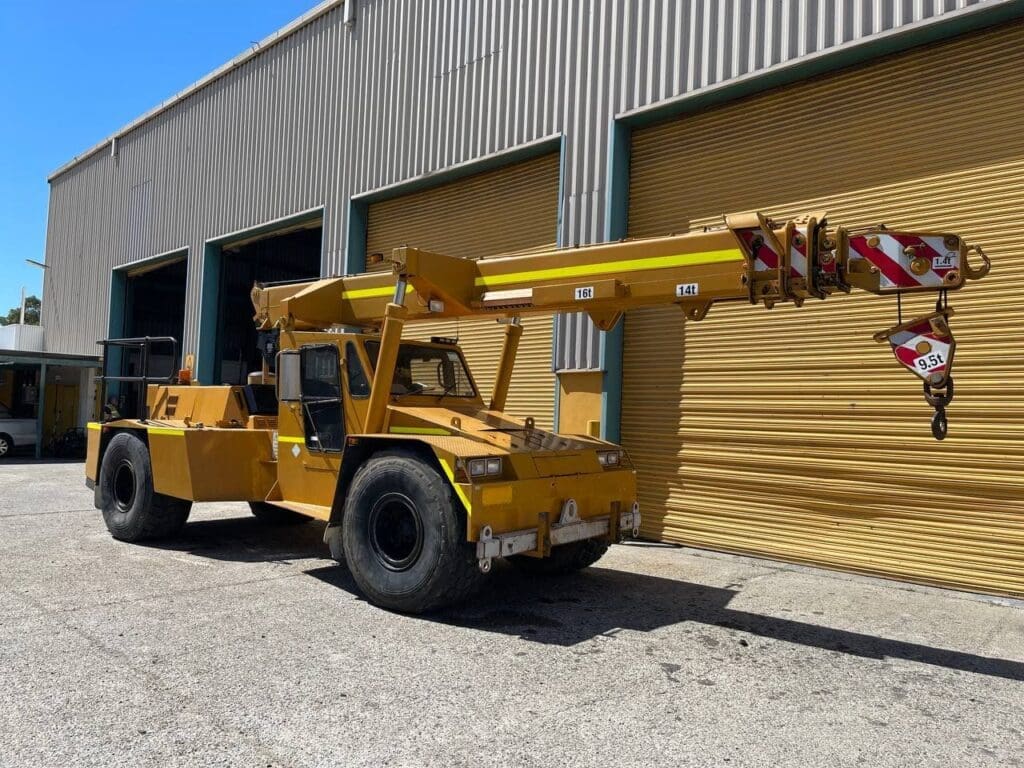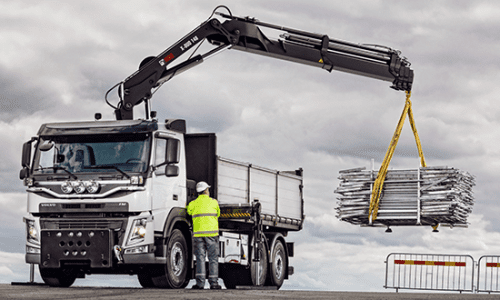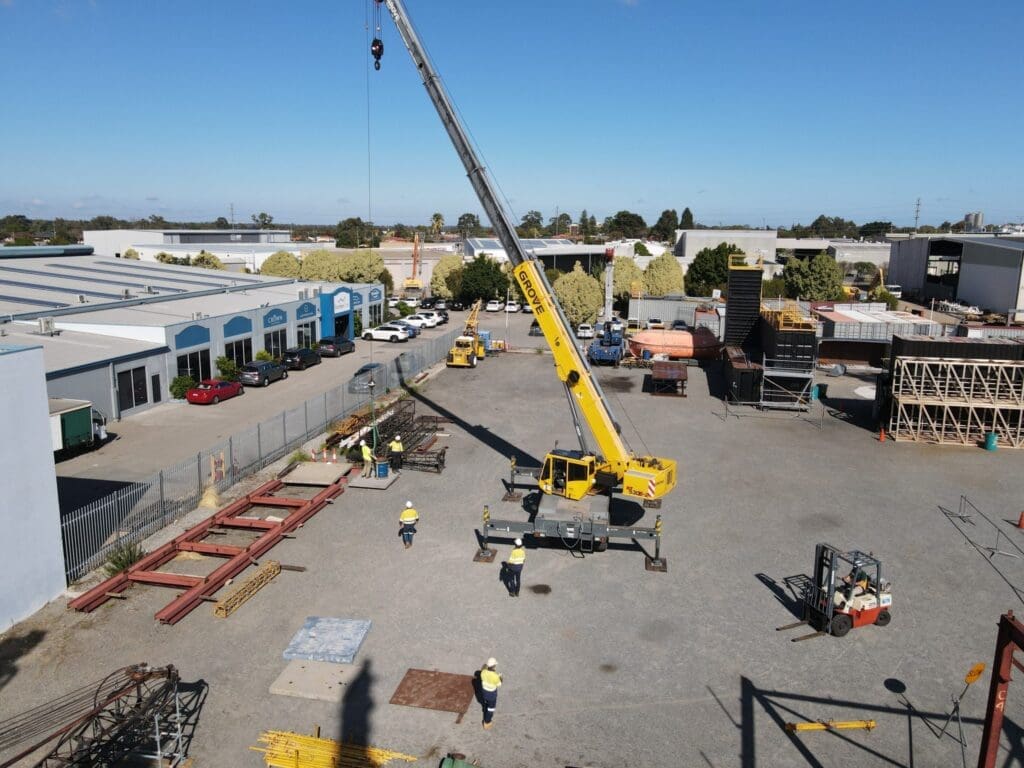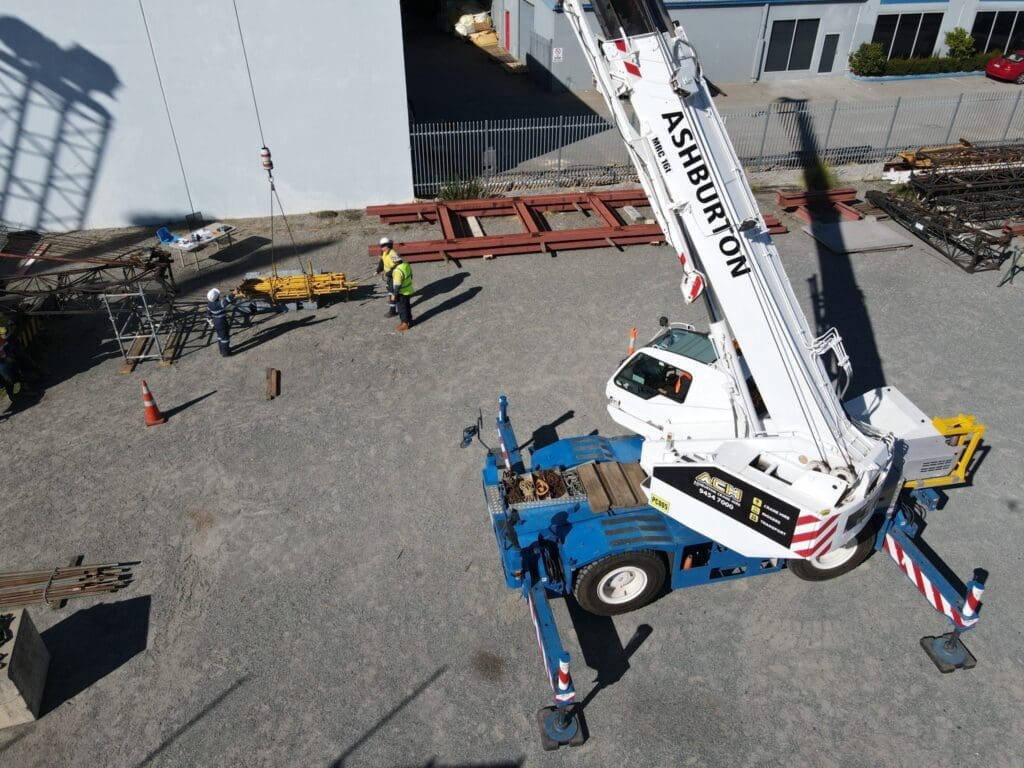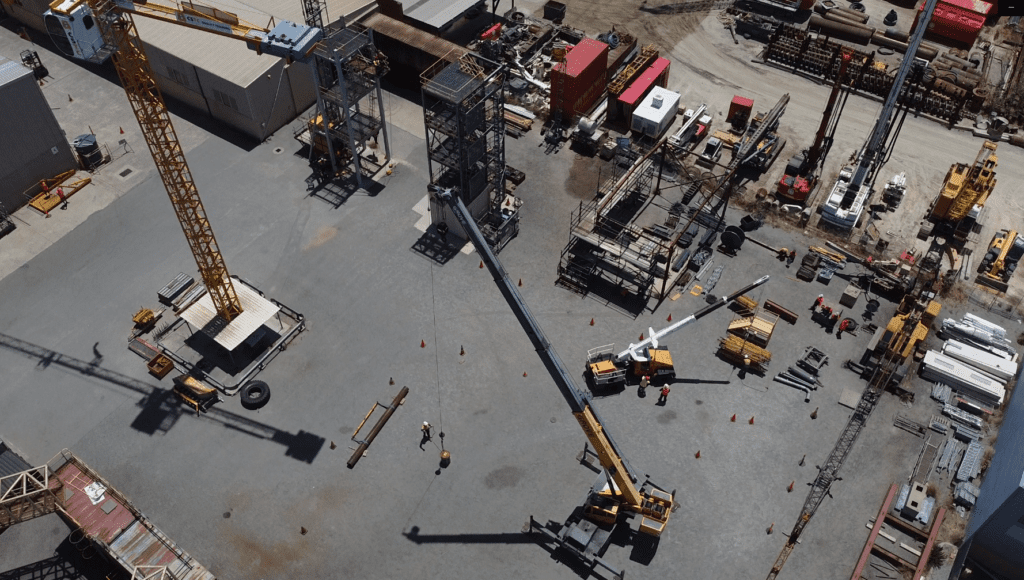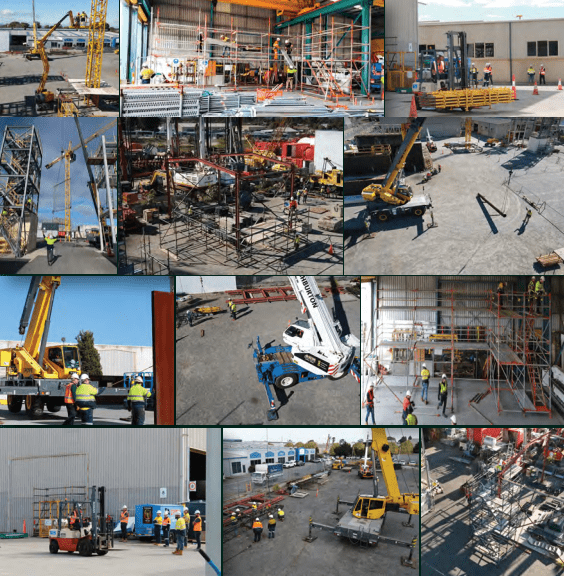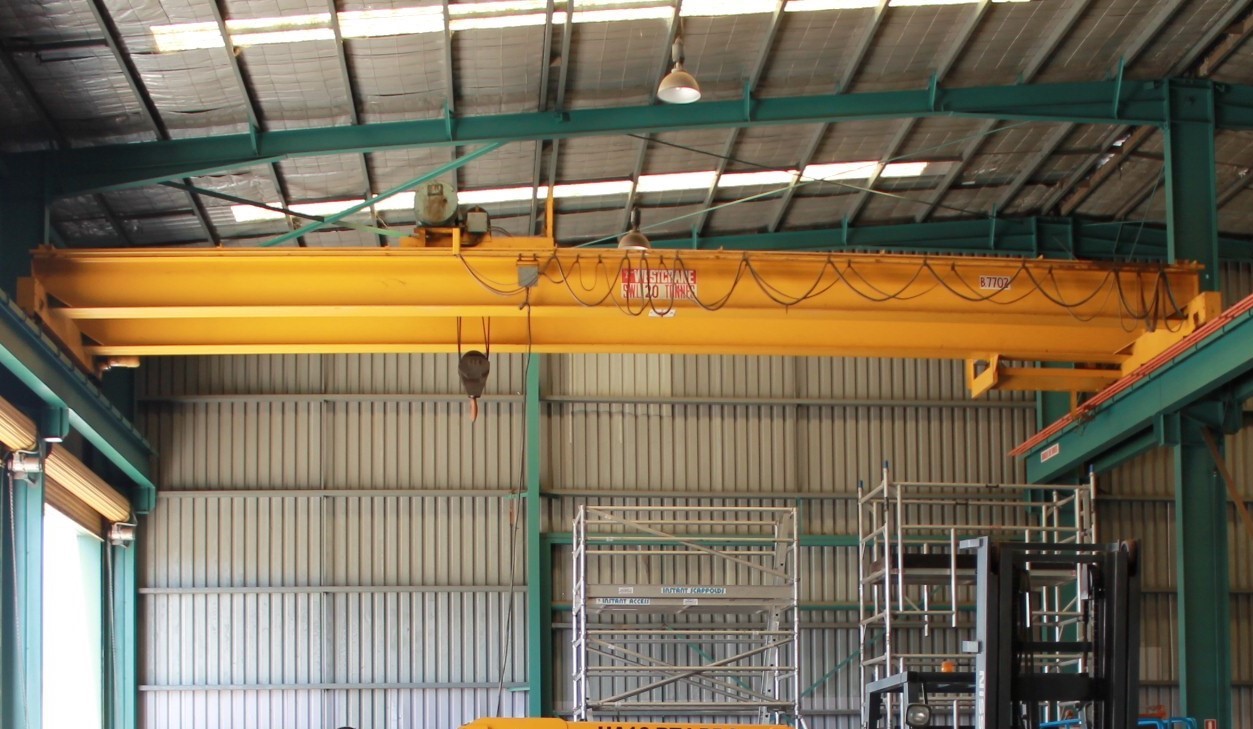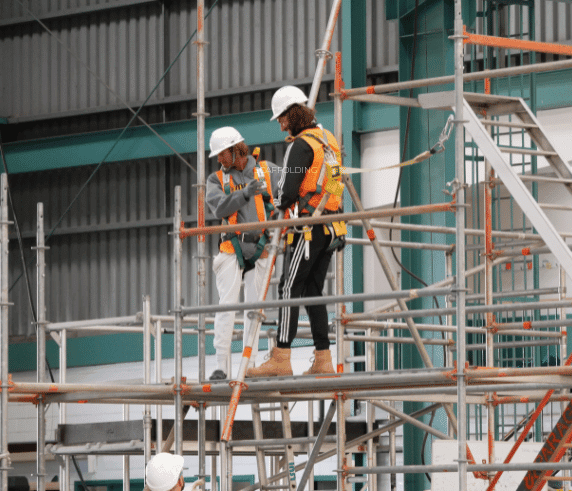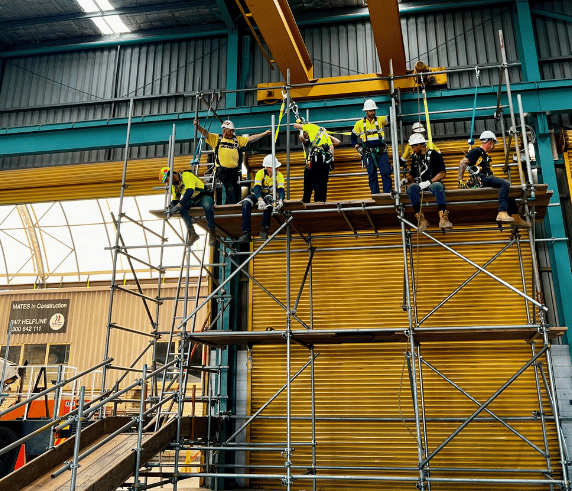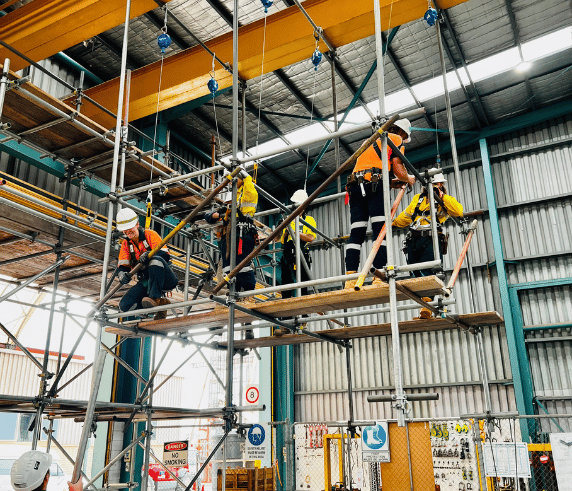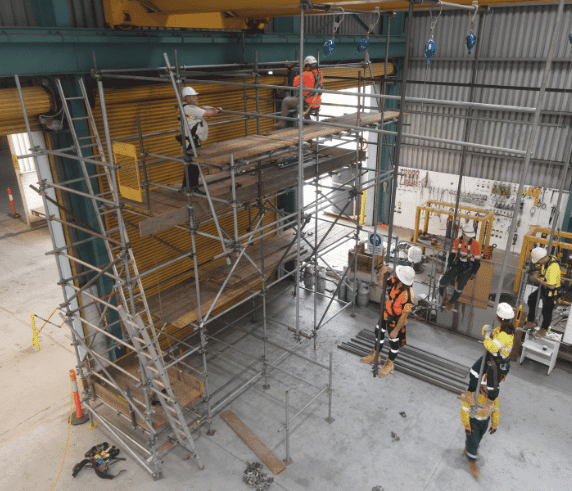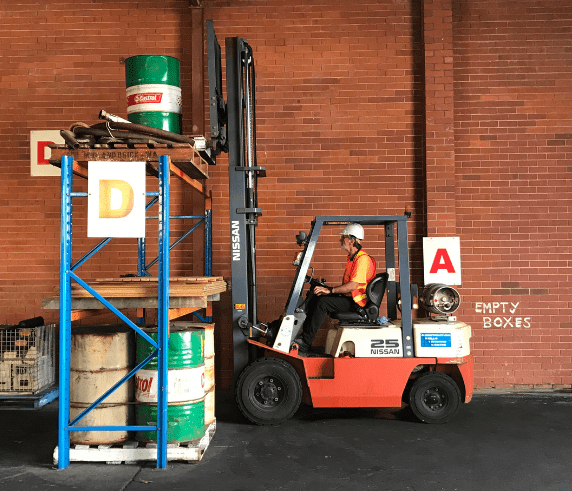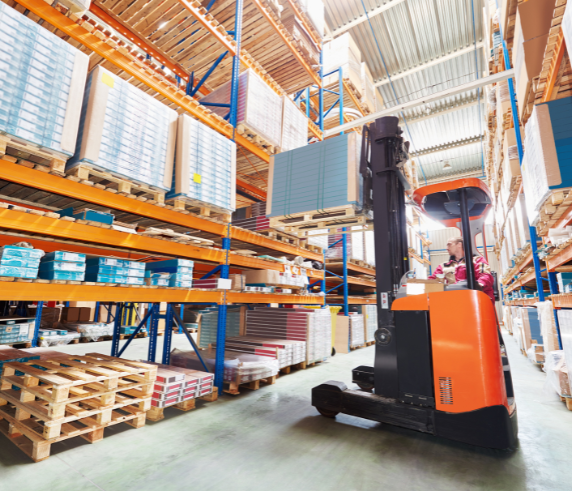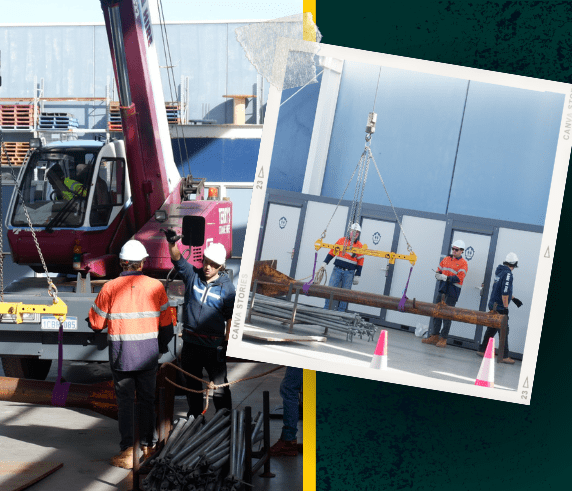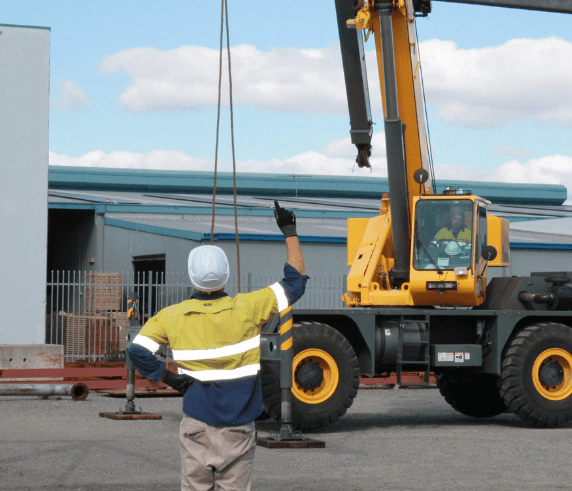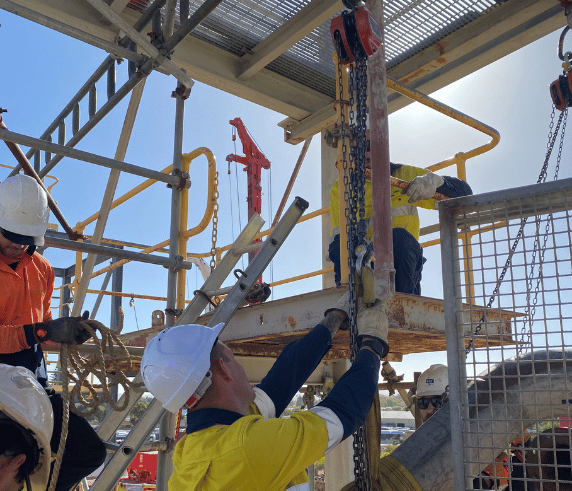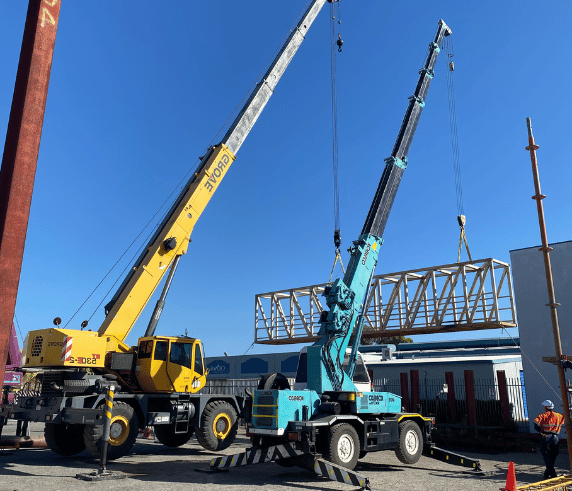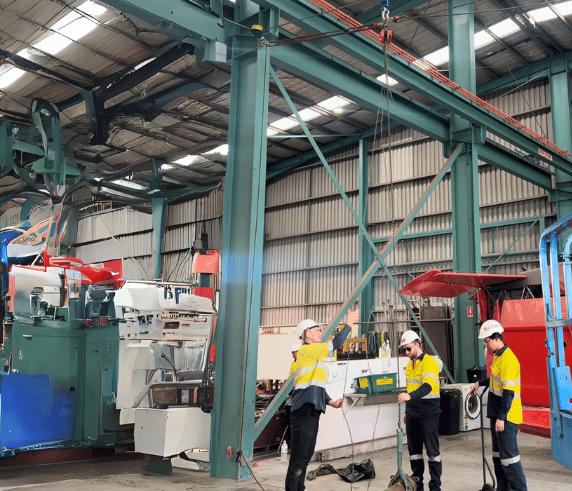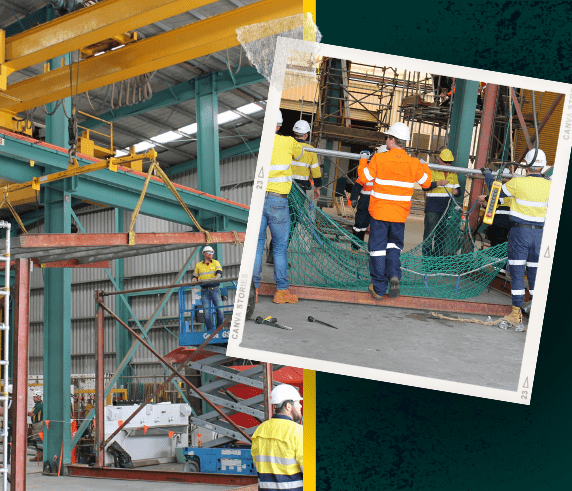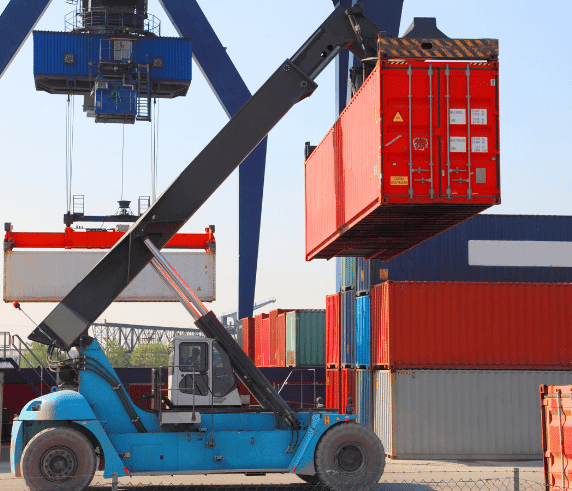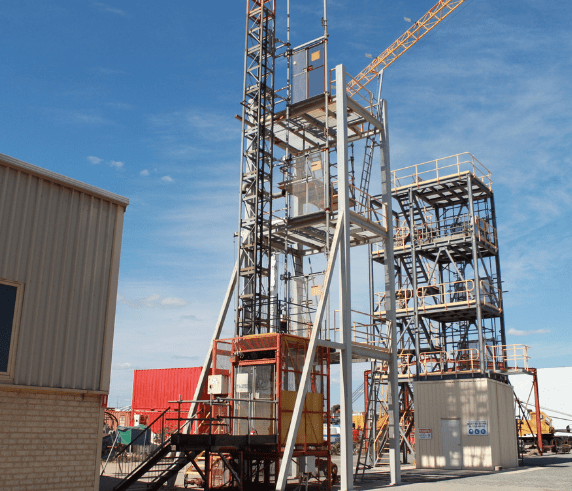All necessary requirements are detailed in the “Entry Requirements” section above. If you are unsure, please submit a ticket by clicking the “Enquire Now” button.
Available Intakes
| Date | Time | Location | Available Spaces | Cost | |
| 18 February 2026 | 07:30 am - 03:30 pm | 107 Radium Street Welshpool | 4 | $700.00 | |
| 25 February 2026 | 07:30 am - 03:30 pm | 107 Radium Street Welshpool | 6 | $700.00 | |
| 4 March 2026 | 07:30 am - 03:30 pm | 107 Radium Street Welshpool | 7 | $700.00 | |
| 11 March 2026 | 07:30 am - 03:30 pm | 107 Radium Street Welshpool | 7 | $700.00 | |
| 18 March 2026 | 07:30 am - 03:30 pm | 107 Radium Street Welshpool | 7 | $700.00 | |
| 25 March 2026 | 07:30 am - 03:30 pm | 107 Radium Street Welshpool | 7 | $700.00 | |
| 1 April 2026 | 07:30 am - 03:30 pm | 107 Radium Street Welshpool | 7 | $700.00 | |
| 8 April 2026 | 07:30 am - 03:30 pm | 107 Radium Street Welshpool | 7 | $700.00 | |
| 15 April 2026 | 07:30 am - 03:30 pm | 107 Radium Street Welshpool | 7 | $700.00 | |
| 22 April 2026 | 07:30 am - 03:30 pm | 107 Radium Street Welshpool | 7 | $700.00 | |
| 29 April 2026 | 07:30 am - 03:30 pm | 107 Radium Street Welshpool | 7 | $700.00 | |
| 6 May 2026 | 07:30 am - 03:30 pm | 107 Radium Street Welshpool | 7 | $700.00 | |
| 13 May 2026 | 07:30 am - 03:30 pm | 107 Radium Street Welshpool | 7 | $700.00 | |
| 20 May 2026 | 07:30 am - 03:30 pm | 107 Radium Street Welshpool | 7 | $700.00 | |
| 27 May 2026 | 07:30 am - 03:30 pm | 107 Radium Street Welshpool | 7 | $700.00 | |
| 4 June 2026 | 07:30 am - 03:30 pm | 107 Radium Street Welshpool | 7 | $700.00 | |
| 10 June 2026 | 07:30 am - 03:30 pm | 107 Radium Street Welshpool | 7 | $700.00 | |
| 17 June 2026 | 07:30 am - 03:30 pm | 107 Radium Street Welshpool | 7 | $700.00 | |
| 24 June 2026 | 07:30 am - 03:30 pm | 107 Radium Street Welshpool | 7 | $700.00 | |
| 1 July 2026 | 07:30 am - 03:30 pm | 107 Radium Street Welshpool | 7 | $700.00 | |
| 8 July 2026 | 07:30 am - 03:30 pm | 107 Radium Street Welshpool | 7 | $700.00 | |
| 15 July 2026 | 07:30 am - 03:30 pm | 107 Radium Street Welshpool | 7 | $700.00 | |
| 22 July 2026 | 07:30 am - 03:30 pm | 107 Radium Street Welshpool | 7 | $700.00 | |
| 29 July 2026 | 07:30 am - 03:30 pm | 107 Radium Street Welshpool | 7 | $700.00 |
CTF Funding Available
Material Hoist Perth Course Fee $700 / CTF Eligible - You Pay Only $452* Conditions Apply
Material Hoist Perth | Hoist Operator Training overview
This Material Hoist Perth in WA / CPCCLHS3002 Licence to Operate a Materials Hoist course, aligning with National High Risk Work Standards, trains participants in operating a materials hoist, a device for lifting goods, not people, using a car, bucket, or platform that moves up and down a structure’s exterior.
This Material Hoist Perth WA course provides essential training for safe and efficient operation, crucial for anyone needing a Hoist Operator Ticket Perth. This Material Hoist Perth course covers:
Plan Task
- Review instructions
- Assess safety
- Identify hazards
- Calculate load
- Establish communication
Select and Prepare Equipment
- Inspect hoist
- Conduct safety checks
- Ensure operational readiness
Conduct Hoist Operations
- Maintain communication
- Operate hoist as per guidelines
- Use signals for emergencies
Shut Down and Secure Hoist
- Follow shut-down procedures
- Secure hoist
- Report any issues
Career Opportunities
Hoist operators in Western Australia are responsible for the safe operation of hoisting equipment, typically used in construction, mining, and industrial settings. This role involves lifting and moving materials, equipment, and personnel to various heights, ensuring all operations adhere to safety standards and regulations.
Material Hoist Course in Perth WA Job Information
Job Roles and Responsibilities
Operate Hoisting Equipment:
Safely operating hoists to lift and lower loads, ensuring precision and safety.
Safety Compliance:
Strictly following safety protocols and procedures to prevent accidents and injuries.
Equipment Maintenance:
Performing routine inspections and maintenance on hoisting equipment to ensure it is in good working condition.
Load Management:
Securing and balancing loads to prevent accidents and ensure efficient operations.
Typical Job Locations
Perth Metropolitan Area:
Numerous opportunities for both short-term and long-term positions within the city and surrounding suburbs.
Regional Areas:
Jobs available in industrial and mining regions such as Kwinana, the Pilbara, and Broomehill, often offering FIFO (Fly-In Fly-Out) arrangements.
Salary and Benefits:
Hourly Wages:
Typically range from $38 to $65 per hour, depending on experience and the specific job requirements, Hoist Operators can earn an average salary ranges from $78,381 to $78,381. For more information on Hoist Operator salaries visit here.
Additional Benefits:
May include overtime pay, site allowances, travel and accommodation for FIFO roles, and superannuation.
Job Opportunities
For detailed job listings and to apply, you can visit SEEK. This platform frequently updates with the latest job openings across various sectors, providing a comprehensive view of available positions. To browse current Hoist Operator jobs in Western Australia, visit here.
Accredited Units
You will be enrolled into the following unit of competency:
Entry Requirements
To enter the Material Hoist Perth WA / Hoist Operator Ticket Perth course, you must meet the following requirements:
- Must be 18 years old and above
- Present a valid photo I.D. on arrival
- Have a USI (Unique Student Identifier)
- Complete the Language, Literacy, and Numeracy (LLN) Assessment. If you have any concerns about your LLN skills, we encourage you to contact us before enrolling.
- If you have any physical conditions that may affect your ability to complete a course, please visit a doctor and obtain a “Fit for Work” certificate, and send it to our bookings email.
- Individuals holding a student visa are not eligible to enrol in, participate in, or attend this course, whether face-to-face or online, as Saferight is not registered with CRICOS (Commonwealth Register of Institutions and Courses for Overseas Students). Student visa holders are encouraged to seek training with a CRICOS-registered institution to meet their requirements. For more information please click here.
Assessment
- Theory Component
- Practical Component
Both components must be successfully completed to receive your certificate and apply for your Hoist Ticket in Perth.
If you already have a Material Hoist ticket and only need a Verification of competency, A VOC for Material Hoist is available at Saferight. For more information, please visit our VOC Material Hoist course.
Certification
On successful completion of this Material Hoist in Perth / Hoist Operator Ticket Perth course, students will receive a:
- Nationally Recognised Statement of Attainment for CPCCLHS3002 – Licence to Operate a Materials Hoist
The Unique Student Identifier (USI) must be supplied and verified prior to issuance.
High Risk Work Licence
Disclaimer: Competence in this unit does not in itself result in a High-Risk Work Licence (HRWL) to operate this equipment or perform this skill. The course price listed excludes HRWL application fees..
A High Risk Work Licence (HRWL) is a photo ID issued to those trained and assessed as competent for high-risk.
Saferight can assist you with your High Risk Work Licence (HRWL) applications to WorkSafe. Please follow the instructions below when enrolling through our website, based on your specific needs:
For New HRWL Applications
- Select “High Risk Work Licence (New)” and “Photo (6x)” during the enrolment process.
- Important: You must select the “Photo (6x)” option when applying for a new HRWL. If you forget to select the photo option, the charge will be added manually when you attend the training.
For Transferring an Existing HRWL
- Select “High Risk Work Licence (Transfer)” and “Photo (6x)” during the enrolment process.
- Important: You must select the “Photo (6x)” option when applying for transferring a HRWL. If you forget to select the photo option, the charge will be added manually when you attend the training.
For Adding a New Class to an Existing HRWL:
- Select “High Risk Work Licence (Adding a Class)” during the enrolment process.
-
- Note: If you’re adding a class to an existing HRWL, you do not need to select the “Photo (6x)” option.
If You Want to Handle Your HRWL Applications Yourself:
- Simply proceed with your enrolment without selecting any of the HRWL options. This allows you to manage your HRWL application independently.
-
- For detailed guidance on applying for a new HRWL yourself, please visit: https://www.commerce.wa.gov.au/worksafe/apply-new-high-risk-work-licence-0
- To add a new licence class to your existing HRWL yourself, please visit: https://www.commerce.wa.gov.au/worksafe/add-class-your-high-risk-work-licence
Duration
1 Day (7.30AM – 3.30PM)
Delivery Locations
This Material Hoist Perth WA / Hoist Operator Ticket Perth course is delivered at the following location:
Fees
Refer to the price listed in the enrolment table.
Group bookings/Onsite training is available at your site or ours. Please click the ‘Enquire Now’ button for further information on pricing and site requirements for our Material Hoist in Perth WA / Hoist Operator Ticket Perth course. For our cancellation and refund policy, please refer to our Refund/Cancellation Policy.
| Title | Fee |
| Course Fee | $700 |
| CTF Discount | $248 |
| You Only Pay The Gap | $452* |
CTF subsidy is granted to those who meet the eligibility criteria, more information can be found here: CTF Eligibility Criteria PDF Guide.
Main eligibility criteria include: Reference and project details of 6 months of construction work in WA out of the past 12 months prior to your course commencement with Saferight. For more information about Saferight’s CTF process, please click here. If student is deemed eligible for CTF, there will be a separate administrative fee of $30.
Apply For CTF Funding
Available Funding
Operated Personnel & Materials Hoist
Interested in personnel & materials hoist? Check out the course page to enrol
Next Steps
DISCLAIMER
Did you know? The deadline for the statutory supervisor exam is on the 30th of march 2026 | Enrol Here – Don’t miss the deadline.
Available Intakes
| Date | Time | Location | Available Spaces | Cost | |
| 18 February 2026 | 07:30 am - 03:30 pm | 107 Radium Street Welshpool | 4 | $700.00 | |
| 25 February 2026 | 07:30 am - 03:30 pm | 107 Radium Street Welshpool | 6 | $700.00 | |
| 4 March 2026 | 07:30 am - 03:30 pm | 107 Radium Street Welshpool | 7 | $700.00 | |
| 11 March 2026 | 07:30 am - 03:30 pm | 107 Radium Street Welshpool | 7 | $700.00 | |
| 18 March 2026 | 07:30 am - 03:30 pm | 107 Radium Street Welshpool | 7 | $700.00 | |
| 25 March 2026 | 07:30 am - 03:30 pm | 107 Radium Street Welshpool | 7 | $700.00 | |
| 1 April 2026 | 07:30 am - 03:30 pm | 107 Radium Street Welshpool | 7 | $700.00 | |
| 8 April 2026 | 07:30 am - 03:30 pm | 107 Radium Street Welshpool | 7 | $700.00 | |
| 15 April 2026 | 07:30 am - 03:30 pm | 107 Radium Street Welshpool | 7 | $700.00 | |
| 22 April 2026 | 07:30 am - 03:30 pm | 107 Radium Street Welshpool | 7 | $700.00 | |
| 29 April 2026 | 07:30 am - 03:30 pm | 107 Radium Street Welshpool | 7 | $700.00 | |
| 6 May 2026 | 07:30 am - 03:30 pm | 107 Radium Street Welshpool | 7 | $700.00 | |
| 13 May 2026 | 07:30 am - 03:30 pm | 107 Radium Street Welshpool | 7 | $700.00 | |
| 20 May 2026 | 07:30 am - 03:30 pm | 107 Radium Street Welshpool | 7 | $700.00 | |
| 27 May 2026 | 07:30 am - 03:30 pm | 107 Radium Street Welshpool | 7 | $700.00 | |
| 4 June 2026 | 07:30 am - 03:30 pm | 107 Radium Street Welshpool | 7 | $700.00 | |
| 10 June 2026 | 07:30 am - 03:30 pm | 107 Radium Street Welshpool | 7 | $700.00 | |
| 17 June 2026 | 07:30 am - 03:30 pm | 107 Radium Street Welshpool | 7 | $700.00 | |
| 24 June 2026 | 07:30 am - 03:30 pm | 107 Radium Street Welshpool | 7 | $700.00 | |
| 1 July 2026 | 07:30 am - 03:30 pm | 107 Radium Street Welshpool | 7 | $700.00 | |
| 8 July 2026 | 07:30 am - 03:30 pm | 107 Radium Street Welshpool | 7 | $700.00 | |
| 15 July 2026 | 07:30 am - 03:30 pm | 107 Radium Street Welshpool | 7 | $700.00 | |
| 22 July 2026 | 07:30 am - 03:30 pm | 107 Radium Street Welshpool | 7 | $700.00 | |
| 29 July 2026 | 07:30 am - 03:30 pm | 107 Radium Street Welshpool | 7 | $700.00 |
I’ve gone through all my HRW training through Saferight. Absolutely wonderful trainers!!
Very good happy place to do your training, the instructors are just lovely.. very professional, they made you feel welcome and relaxed , answered all my questions, very satisfied
Best training center around Perth, quality, educational and best value for money course!
Very knowledgeable and enjoyable as far as training courses go, would recommend to anyone interested in furthering their training.
I had the privilege of attending the Advanced Scaffolding course at Saferight Training, and let me tell you, it was an absolute blast!
Confined spaces was great all the trainers are experienced and competent here
Finished a Tele-Handler course here a few weeks ago, and after finishing a rigging course at one of the other major training companies in Perth I have to say Saferight is definitely the better of the two..
Very good experience and the training was informative, the instructor presented well. The practicals were set up really well also
The 4WD course was very informative, particularly the practical aspect which developed fundamental skills for traversing rough terrain!
Very interesting course. Gives you confidence in learning to trust the vehicles and confidence in driving off-road - 4WD.
Frequently Asked Questions
-
-
If you see a green tick under ‘Funding’ at the top of the page and a ‘CTF Funding Available’ box beneath the enrolment table, the course is funded by CTF. If these indicators are absent, the course is not CTF-funded. For more information about CTF, click here.
-
All courses run at Saferight are Nationally Accredited in Australia, except for permit issuers, Height Safety Supervisor, and courses under the VOC category.
-
This course does not include a High Risk Work Licence (HRWL). However, you can choose an additional option during enrolment for us to manage your HRWL application to WorkSafe. Otherwise, you must apply directly to WorkSafe.
-
Your certificate will be available in 2-3 business days after you’ve completed the course. Our admin team will also send you the PDF version via email. If you have any inquiries related to your certificate, please click the ‘Enquire Now’ button.
-
Individuals holding a student visa are not eligible to enrol in, participate in, or attend any of our courses, whether face-to-face or online. Because Saferight is not registered with CRICOS (Commonwealth Register of Institutions and Courses for Overseas Students). Student visa holders are encouraged to seek training with a CRICOS-registered institution to meet their requirements.
Related Posts
-
Safety and efficiency are two of the biggest priorities in construction. Having the right equipment for moving people and materials around the site is essential to keeping everything on track. At Saferight, we know that terms like “Personnel & Materials Hoists” and “Materials Hoist” can sound pretty technical, especially if you’re not deep in the industry. But don’t stress – we’re here to break it down for you.
In this post, we’ll explain exactly what these hoists are, how they differ, and how to choose the right one for your needs. Whether you’re looking to boost your career or just stay on top of compliance, we’ve got the info to help you make the best decision.
What is a Personnel & Materials Hoist?
A Personnel & Materials Hoist is an industrial lift built to safely move workers and materials up and down multi-level construction sites. These hoists are designed so a worker can get to their workspace with all the gear and materials they need, making them ideal for complex layouts and high-rise projects.
Because it’s a dual-purpose hoist, the Personnel & Materials Hoist has to meet strict safety standards and include top-notch safety features to protect everyone onboard. At Saferight, we offer the Operate Personnel and Materials Hoist Course, giving you hands-on training in using these specialised hoists. This course covers everything you need to know, from safely loading and unloading to following specific safety practices in areas where workers and materials are being moved.
What is a Material Hoist?
A Materials Hoist is specifically designed to lift and move heavy materials between different levels at a construction site – it’s not built for carrying people. This type of hoist is perfect for sites where only materials need to be transported, with no requirement to move workers. Because of its unique purpose, a Materials Hoist has its own set of safety regulations and procedures, which differ from those for a Personnel & Materials Hoist.
Saferight’s Materials Hoist Operation Course equips participants with the skills and knowledge to safely operate a Materials Hoist. This training covers safe loading and unloading practices, important safety regulations, and thorough pre-operational checks, all of which help minimise the risks involved in material handling.
Key Differences Between Personnel & Materials Hoists
While both types of hoists are designed to move loads vertically, there are some key differences to keep in mind when choosing the right training or career path:
- Personnel Capability: A Personnel & Materials Hoist is built to move both workers and materials, while a Materials Hoist is strictly for transporting materials – no passengers allowed.
- Safety Requirements: Since it carries people, the Personnel & Materials Hoist has stricter safety standards and requires specially trained operators to ensure everyone’s safety.
- Use Cases: Personnel & Materials Hoists are generally used on multi-storey projects where workers need access to different levels. Materials Hoists, on the other hand, are ideal for moving materials only, often used at supply stations or on sites with lower-rise constructions.
Understanding these differences can help guide your career and training choices, making sure you’re prepared and compliant with safety standards.

Get certified in operating a personnel and materials hoist with Saferight’s industry-leading training course Personnel Materials Hoist Training Perth:
- Duration: 2 Day (7:30 AM – 3:30 PM)
- Cost: $200 (CTF Funding available, you only pay $304*)
- Location: Welshpool
- Delivery Mode: Face-to-Face
- Accreditation: Nationally Recognised Training
- Overview: This course trains participants to operate builders’ hoists, including cantilever, tower, and winch types, for transporting personnel, goods, and materials—fully aligned with National High Risk Work Standards.
Enrol online—classes are available weekly.

Elevate your skills in construction with our Licence to Operate a Materials Hoist course Materials Hoist Training:
- Duration: 1 Day (7:30AM – 3:30 PM)
- Cost: $200 (CTF Funding available, you only pay $352*)
- Location: Welshpool
- Delivery Mode: Face-to-Face
- Accreditation: Nationally Recognised Training
- Overview: This Materials Hoist course trains you to operate a materials hoist a device for lifting goods (not people) via car, bucket, or platform along a structure’s exterior – Aligned with National High Risk Work Standards.
Enrol online—classes are available weekly.
Why Training Matters for Each Type of Hoist
Operating hoists without proper training can be seriously dangerous and lead to costly mistakes. Saferight’s training programs give you both the knowledge and hands-on experience needed to safely operate either a Personnel & Materials Hoist or a Materials Hoist. Each course covers the specific hazards, safety regulations, and best practices unique to each hoist type, so you’re fully prepared for the demands of your role.
Whether you’re working on a multi-level construction site moving personnel or on a standard site transporting materials, our courses ensure you’re confidently and compliantly trained for safe operation.
Selecting the Right Course for Your Career
If you’re working in construction and want to specialise in hoist operations, it’s essential to choose the course that best fits your career goals:
For Personnel & Materials Hoist Operators:
Our Operate Personnel and Materials Hoist course equips you with the skills to safely transport both workers and materials around the site. This course is ideal for those working on large construction projects that require regular personnel movement across multiple levels.
For Materials Hoist Operators:
If your role involves moving materials only, our Operate a Materials Hoist course provides the specialised training needed for safe and efficient material handling. This course is perfect for those working on sites focused solely on material movement, such as supply stations or low-rise construction projects.
Frequently Asked Questions (FAQs) About Materials Hoist & Personnel Hoist Training in Perth WA
1. Do I need a license to operate a Personnel and Materials Hoist in Australia?
Yes, operators are required to obtain a High Risk Work License to operate personnel and materials hoists legally in Australia. This license ensures the operator has the training and competency to operate the equipment safely.
2. What are the prerequisites for enrolling in a Materials Hoist training course?
Participants usually need to be at least 18 years old, hold a White Card (Construction Induction Card), and possess basic English literacy and numeracy skills. Some training providers may have additional requirements.
3. How long does the training for operating a Personnel and Materials Hoist take?
Training duration varies by provider, but most courses take about 1–3 days, including both theoretical and practical components. Some courses may offer accelerated options depending on prior experience.
4. What safety regulations should be followed when operating a Personnel and Materials Hoist?
Operators must follow Work Health and Safety (WHS) guidelines, including pre-operational checks, load limitations, securing loads, and using proper signaling. Regular maintenance and safety checks are also mandatory.
5. Can I operate a Personnel and Materials Hoist with an expired High Risk Work License?
No, it’s illegal to operate a Personnel and Materials Hoist with an expired license. You must renew your license through the relevant authority in your state or territory, typically by completing refresher training and demonstrating continued competency.
6. What is a Personnel and Materials Hoist, and where is it used?
Personnel and Materials Hoists are types of lifting equipment used on construction sites to move workers, materials, and equipment vertically. They are essential for multi-story buildings, helping with efficiency and safety in moving heavy loads.
7. How much does a Personnel and Materials Hoist training course cost in Australia?
Costs can vary widely, from approximately AUD 300 to AUD 700, depending on the training provider, location, and course duration. It’s advisable to compare providers for the best value.
Additional Resources for High-Risk Training & Compliance
For those looking to deepen their understanding of materials hoist operations, high-risk work requirements, and compliance in Australia, here are some helpful resources:
- WorkSafe Western Australia – Workplace Safety Guidelines: Access detailed safety guidelines and compliance requirements for high-risk work, including materials hoist operations. This resource provides essential information on licensing, safety protocols, and best practices tailored to Western Australia.
- Construction Training Fund (CTF): Learn about the Construction Training Fund, which provides financial support for skills development in the construction industry. Find out how to apply for funding to help cover costs for materials hoist training, making it easier to meet compliance requirements while reducing training expenses.
- Australian Standards for Hoists – Standards Australia: Access comprehensive standards for the safe use and maintenance of materials hoists in construction. This resource is invaluable for those aiming to align with industry best practices and ensure workplace safety.
Take the Next Step with Saferight’s Hoist Training Courses
Ready to level up your construction career? Saferight’s Operate Personnel and Materials Hoist and Operate a Materials Hoist courses provide the practical, industry-recognised training you need to work safely and confidently on-site. Our courses are designed to prepare you for real-world applications, ensuring you’re skilled in safe operations and fully compliant at every stage.
Whether you’re looking to specialise in personnel and materials hoist operations or focus solely on materials handling, our accredited courses give you the expertise and confidence to excel in the construction industry.
Classes are available weekly, so don’t wait—secure your spot today and start your journey to becoming a certified hoist operator! Enrol in Saferights High Risk courses here.
-

THE ROLE OF A CRANE OPERATOR
Crane operators use cranes to lift and move heavy objects at locations such as construction sites, large-scale manufacturing operations, mine sites, wharves, and other work sites. When setting up at a site, crane operators must check the condition of the ground, ensuring that it is firm and level, and for any potential obstacles, such as overhead powerlines. They must also be aware of the safe working limits of their crane, to ensure that loads are not too heavy, and that the crane’s reach is not over-extended. Crane operators often work closely with doggers, observing and following their directions to guide loads into position.
Under the WHS legislation, you must be licenced to operate cranes in Australia. A crane licence is also required if you intend to use an earthmoving machinery/mobile plant to hoist any load. Additionally, you will need to apply for a High Risk Work Licence from WorkSafe, which we can help you process.
Saferight recommends getting a nationally accredited crane ticket/qualification to ensure your team is formally trained and is fully qualified.
Licence code
Description
CV
Vehicle loading crane with a capacity of 10 metre tonnes or more
CN
Non slewing mobile crane with a capacity exceeding 3 tonnes
CO
Slewing mobile crane with a capacity over 100 tonnes
C1
Slewing mobile crane with a capacity of 100 tonnes or less
C6
Slewing mobile crane with a capacity of 60 tonnes or less
C2
Slewing mobile crane with a capacity of 20 tonnes or less
Crane Operator – Nationally Accredited Crane Tickets

SELF-ERECTING TOWER CRANE (CS) AND TOWER CRANE (CT)
There are 2 main tower crane licence classes:
NON-SLEWING MOBILE CRANE LICENCE
Franna cranes are also commonly referred to as “taxi” cranes, as they can pick up and carry heavy loads across a worksite.
Their popularity stems from their versatility and multipurpose use, which allows them to be used in a variety of settings, such as construction sites, workshops, plant sites and mines.
The Franna crane was a different design to what the construction industry was used to; it offered a similar lifting capacity to “tractor cranes” but provided far more visibility for the crane operator, with the driver’s cab located at the front of the crane.

By positioning the cab at the front of the crane, David Francis had designed a crane that did more than just lift supplies high or from side to side; the crane could be driven on every day roads to transport goods and equipment.
Franna crane company founder David Francis creatively conned the term “Franna” cranes by combining two names – his own name and the name of his daughter Anna.

VEHICLE LOADING CRANE LICENCE
A vehicle loading crane is a crane mounted on a vehicle for the purpose of loading and unloading that vehicle. Vehicle loading cranes are also commonly referred to as a ‘HIAB” crane. With the introduction of larger capacity vehicle loading cranes and proportional control (the ability to operate multiple crane functions simultaneously), they are also used for more traditional crane operations where the load is lifted.
From the vehicle to an elevated area at a workplace, for example lifting packs of timber from the vehicle directly to a building floor
Both to and from locations remote from the vehicle on which the crane is mounted, and
Into place and held while it is connected to a structure e.g. installing a sign.
SLEWING MOBILE CRANE LICENCE – ALL CLASSES


CRANE LICENCE ENCOMPASSMENTS
According to WHS legislations, below is a summary of high-risk class work according to the individual licence class. Depending on the licence class, a crane operator can operator other cranes in different classes.
- CO licence encompasses the CV, CN, C2, C6 and C1 licences.
- C1 licence encompasses the CV, CN, C2 and C6 licences.
- C6 licence encompasses the CV, CN and C2 licences.
Source: Work Health and Safety (General) Regulations 2022 Regulations, Schedule 3 High Risk Work Licences and Classes of High Risk Work (Austl)

TRAIN WITH SAFERIGHT
Saferight (RTO Code 5722) offers a range of Crane Training Courses in Perth designed for multiple environments including construction, mining, emergency and the working at heights industry. All of Saferight’s Crane Training Perth courses are in accordance with the www.training.gov.au to learn skills and acquire a license to work in situations that require proficiently and safely operating a Crane.
The courses are divided into different levels and categories specifically designed for students, new professionals, and those that require a refresher. All include theoretical and practical lessons such as obtaining site information and elements related to the tasks, identifying hazards and potential hazards within the environment, and using appropriate communication methods with crane operators and other appropriate personnel.
The assessment will follow a practical application of all lessons learned and experiences acquired to ensure the quality of knowledge and skills acquired throughout the course. Upon successfully completing the Crane Operator Training Courses, you will be issued with a Nationally Recognised Statement of Attainment as well as the corresponding crane operator ticket in Perth.
If you wish to pursue other training courses together with Crane operations, browse online and book your preferred schedule.
Saferight offers a range of crane operator tickets such as:
- CPCCLTC4001 – Licence to Operate a Tower Crane
- CPCCLTC4002 – Licence to Operate a Self-Erecting Tower Crane
- TLILIC0002 – Licence to operate a vehicle loading crane (capacity 10 metre tonnes and above)
- TLILIC0008 – Licence to Operate a Non-Slewing Mobile Crane (Greater than 3 Tonnes Capacity)
- TLILIC0013 – Licence to Operate a Slewing Mobile Crane (Up to 60 tonnes)
- TLILIC0014 – Licence to Operate a Slewing Mobile Crane (Up to 100 Tonnes)
- TLILIC0015 – Licence to Operate a Slewing Mobile Crane (Over 100 Tonnes)
Other High Risk Courses offered at Saferight:
Rigging:
Scaffolding:
All high-risk training courses and Crane Operator Training courses are conducted in our high-risk training facility in Welshpool, Western Australia, where we have the latest equipment and the most experienced facilitators to train groups and individuals.
As a Registered Training Organisation (RTO Code 5722), we offer Nationally Accredited training courses, including operating different types of Cranes for construction or maintenance. With over 32 years of industry experience, and our standing within the local community, we firmly believe that you won’t find a more qualified or better-recognised trainer for Crane Operations in Perth.
We conduct our safety training sessions at our dedicated facilities, but we can also arrange to bring the training to your facility. Call us toll-free on 1800 352 335 to arrange Crane Training sessions for your team or contact us via our website to request more information.

get qualified.
Get your crane and high risk tickets/accreditation from Saferight. -
SAFERIGHT GANTRY CRANE COURSES
SAFERIGHT is a Registered Training Organization (RTO) with RTO Code 5722 that provides safety training to the oil and gas, mining, utilities, construction, and government industries in Perth, Western Australia. We have a variety of safety training courses, with a focus on high-risk, plant machinery, confined space, height safety, and rescue. At our warehouse in Belmont, we manufacture height safety and rope access equipment such as fall right harnesses, slings, belts, and lanyards under the Australian Standard AS/NZS 1891. SAFERIGHT’s Engineered Systems group specializes in customizing fall injury prevention systems to suit every site and working environment. Site audits, rope access facility maintenance, height protection system inspections, and specialized working at heights operations are among the other services available.
OVERHEAD CRANE
Many companies use overhead cranes to lift large and oversized structures that other material handling methods cannot handle. Overhead cranes include a railed support framework called a bridge, as well as a wheeled trolley that runs horizontally across the bridge. Another main feature of an overhead crane is the hoist, which is connected to the trolley and used to conduct the lifts. Gantry, cantilever gantry, semi-gantry, storage bridge, and wall cranes are all examples of overhead cranes.
OVERHEAD CRANE – SAFETY REQUIREMENTS
Due to the size and weight of the items that overhead cranes raise and transport daily, regular inspections are required to ensure their continued safe operation. Before a crane may be used, it must pass an initial inspection.
Once overhead cranes are operational, they must undergo two forms of inspections:
Frequent inspection: Such inspections are conducted regularly, ranging from daily to monthly. The following items are inspected daily:
- Functional operating mechanisms are inspected for malfunctioning.
- Crane hooks are inspected for deformation or cracks.
- Hydraulic and air system components are inspected for corrosion or deficiency in lines, valves, drain pumps, tanks, and other parts.
Periodic Inspections: The inspections are carried out between 1 and 12 times per year. Several features often necessitate monthly inspections or other actions:
- Hoist chains and end connections are inspected for distortion, excessive wear, twitching, or anything that may interfere with their function or cause them to extend beyond the manufacturer’s recommendations.
- Rope and end connections are checked every month for broken strands or wear.
- Written records of each inspection must be meticulously updated, and all documents must be kept up to date.
These inspections are designed to look at the crane’s key components. This aids in determining the degree of the failure of crane parts, corrosion, or wear and tear.
OVERHEAD CRANE – TRAINING COURSES
SAFERIGHT offers 2 courses that are related to overhead cranes:
1. GANTRY CRANE
The Gantry Crane training course is designed for people who work or want to work in operational positions in the construction and mining industries and need to operate a crane. Students can gain the practical knowledge and understanding needed to operate an overhead/gantry crane safely and efficiently. After completing the training, students would be able to apply the standards, procedures, and techniques for completing a gantry or overhead crane operation in a secure, reliable, and efficient manner.
2. PENDANT GANTRY CRANE
This Pendant Gantry Crane Ticket is for people who work with or want to work with a remote-controlled pendant gantry crane that makes fewer than three motions. Students will be able to understand certification requirements for bridge and gantry cranes, OHS legislation and regulations, safe working procedures for cranes, safe working tags on slings, crane maintenance, and more.
For more information on Saferight Gantry Crane courses in Perth, please call us on 1800 352 335 or send us an email at bookings@saferight.com.au.
Related Courses
This Basic Scaffolding Ticket Perth Course covers erecting, altering, dismantling basic scaffolds, using modular/pre-fabricated scaffolds, materials hoists (max 500kg), ropes, gin wheels, safety nets, static lines, and bracket scaffolds for licensing.
This Intermediate Scaffolding Course Perth covers erecting, altering, dismantling intermediate-level scaffolds including cantilevered platforms, spurred scaffolds, barrow ramps, safety screens, mast climbers, and tube and coupler scaffolds for licensing.
This Advanced Scaffolding Course Perth (CPCCLSF4001) covers erecting, altering, dismantling advanced scaffolds, including all intermediate tasks, plus hung and suspended scaffolds, for licensing.
This Intermediate and Advanced Scaffolding Course Perth teaches erecting, altering, dismantling at advanced levels, encompassing all intermediate tasks and specialised work with hung and suspended scaffolds for licensing.
Based on the National Standard for High Risk Work Licensing, this course trains individuals to operate boom-type elevating work platforms (EWP) with booms over 11 metres.
This Forklift Licence in Perth WA course is based on the requirements of the National Standard for Licensing Persons Performing High Risk Work. Perfect for those seeking a Forklift Ticket in Perth (LF) via comprehensive Forklift Training in Perth
This Order Picker Forklift Licence in Perth WA course will equip you with the skills and knowledge to navigate tight spaces, use the platform lift system, and handle goods safely using an order picking forklift as per the national code TLILIC0004.
This Dogging and Rigging Course in Perth trains students for a licence in mining or construction. It covers everything from equipment movement to steel erections, expert slinging techniques, lifting gear selection, and effective crane operation.
This Dogging course in Perth WA trains students for a licence in mining or construction. Covering slinging techniques, lifting gear selection, inspection, and crane operator direction for load movement, especially when the load is not visible.
The Rigging Course Perth at Saferight covers basic rigging for plant/equipment movement, steel erections, hoists, pre-cast concrete placement, safety nets/lines, perimeter screens, shutters, and cantilever crane platforms. This Basic Rigging Course Perth is ideal for those aiming to obtain a Riggers Ticket and work in the construction or industrial sectors.
This Intermediate Rigging Course covers all basic level skills, plus advanced rigging of cranes, conveyors, dredges, excavators, tilt slabs, demolition work, and dual lifts for licensing.
The Intermediate Rigging Course in Perth WA at Saferight provides comprehensive training which covers all basic level skills, plus advanced rigging of cranes, conveyors, dredges, excavators, tilt slabs, demolition work, and dual lifts for Intermediate Rigger Course Perth licensing.
The Advanced Rigging Course Perth at Saferight is designed for those looking to expand their rigging skills to an advanced level. This course is ideal for individuals aiming to obtain an Advanced Rigger Course Perth certification, teaching skills for basic and advanced rigging, including cranes, conveyors, dredges, excavators, tilt slabs, demolition, and dual lifts.
The Basic and Intermediate Rigging course teaches how to move plant and equipment, steel erection, hoists, pre-cast concrete placement, safety nets, static lines, and cantilever crane loading platform, cranes, conveyors, dredges, excavators, tilt slabs, demolition, and dual lifts.
This Rigging course, encompassing Intermediate and Advanced levels covers rigging skills for cranes, conveyors, dredges, excavators, tilt slabs, demolition, and dual lifts.
This Reach Stacker course applies to the activities of a person operating a reach stacker greater than 3 tonnes capacity that incorporates an attachment for lifting, moving and travelling with a shipping container
This Operate Personnel and Materials Hoist course provides skills to operate builders’ hoists for hoisting personnel, goods, materials, covering car, structure, machinery, cantilever, tower hoists, and multiple winch operations.
Have some questions?
If you have any questions related to the Material Hoist Perth | Hoist Operator Training please click the enquiry form button
